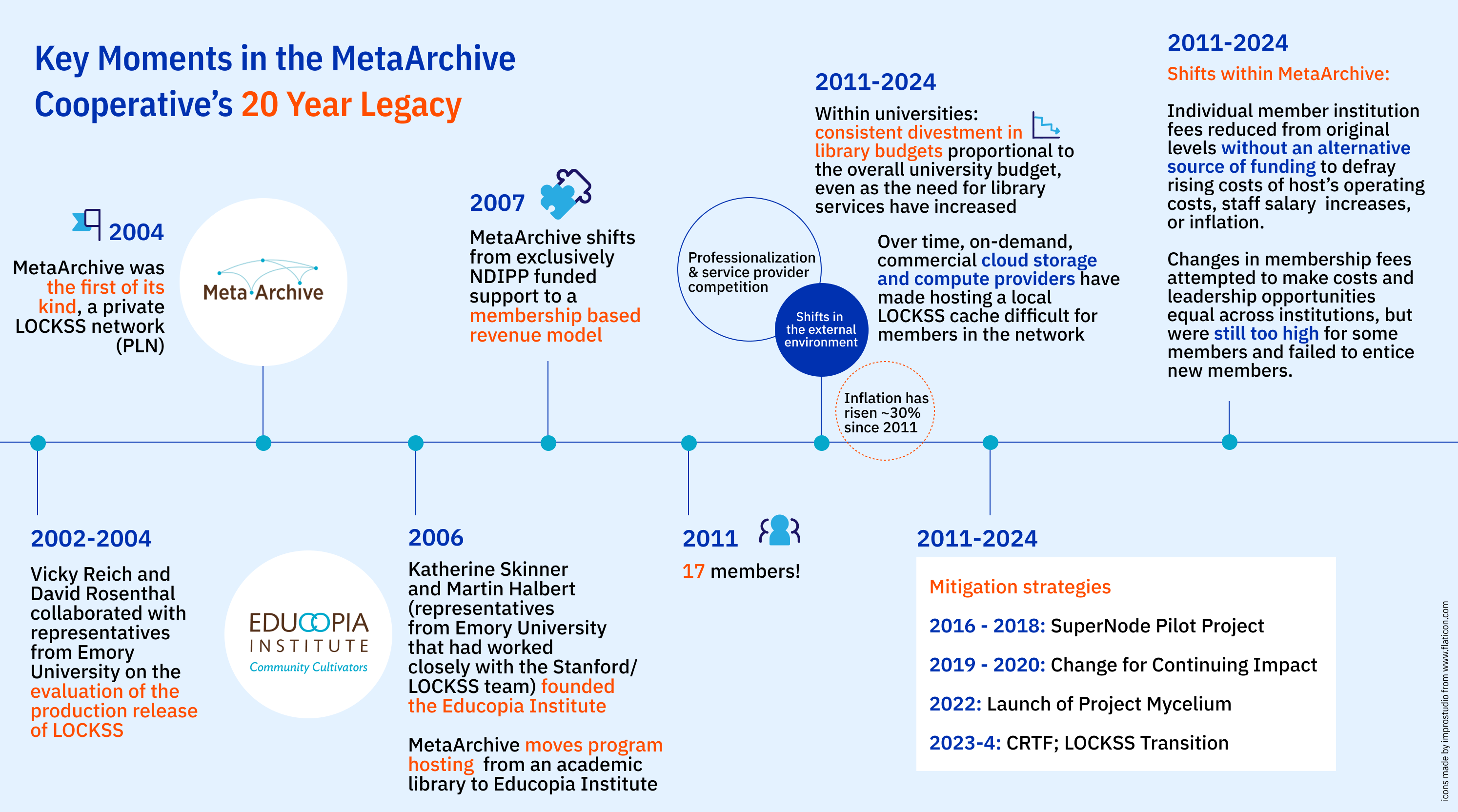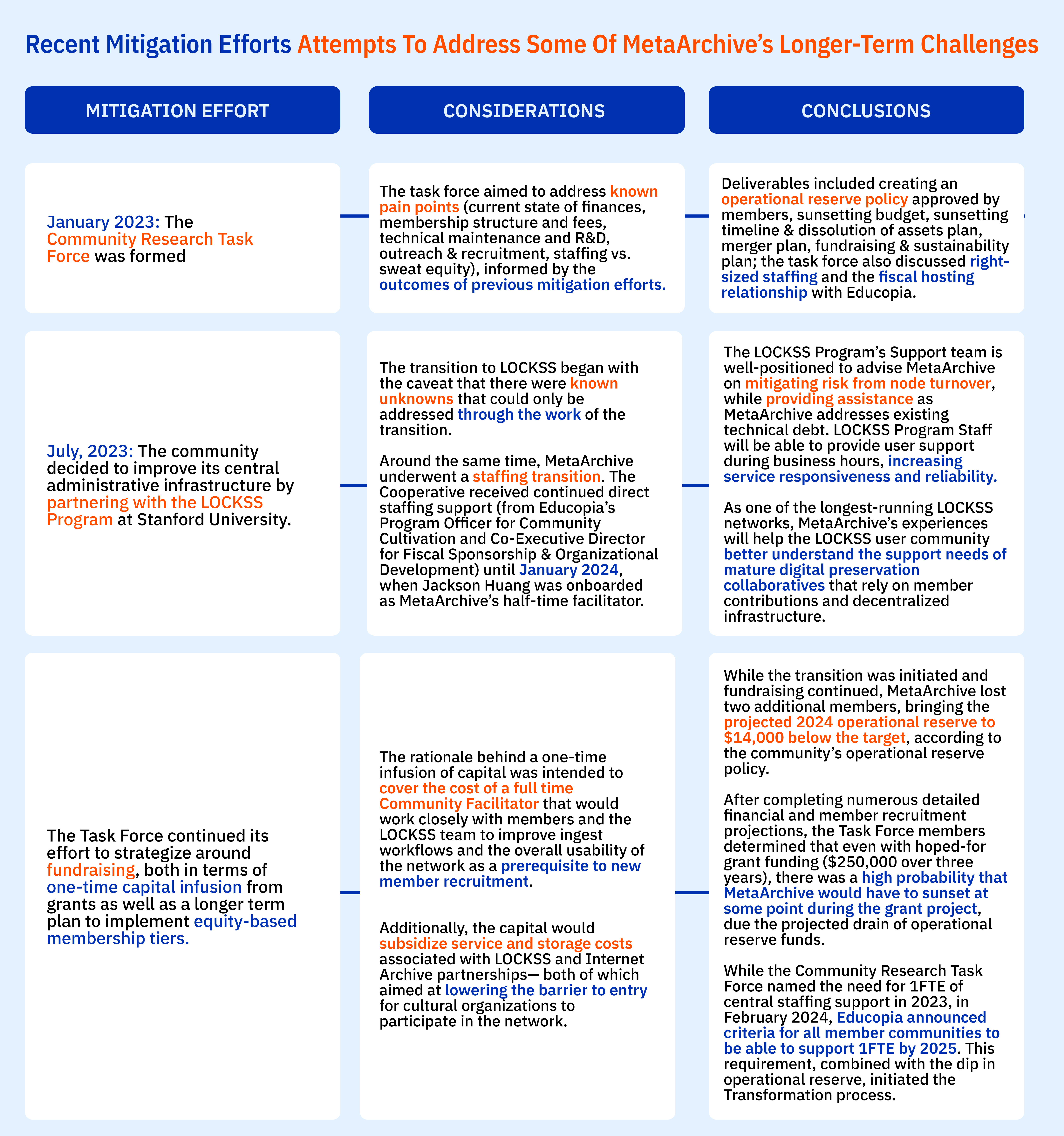MetaArchive Leads PLN Transformation
April 15, 2024
In Summary:
In 2025, MetaArchive will experience a major transition. No longer hosted by Educopia Institute beyond the coming year, the Cooperative will work with Educopia and LOCKSS to navigate administrative and technical transformation—a new phase for the long running PLN.
- MetaArchive Cooperative is undergoing an administrative and technical transformation, because by the end of 2025, MetaArchive will no longer be hosted by Educopia Institute.
- In March 2024, we completed the transfer of the technical infrastructure to the LOCKSS Program. LOCKSS will continue to provide technical support to the network and will be instrumental in the transformation process.
- The Cooperative remains intact as a group, and the data held within its networks remains secure.
- The Cooperative is convening a Transformation Research Team to bring together the expertise, perspectives, and efforts of key stakeholder groups to determine clear, feasible pathways for MA members.
- Emergent strategies and lessons learned during MetaArchive’s evaluation and evidence-based decision making processes will be shared transparently with the broader PLN community, so that they may serve as a learning resource for peer organizations striving for sustainable digital preservation through community collaboration.
Founded in 2004, the MetaArchive Cooperative has been consistently defining what it entails to be a digital preservation network created and hosted by and for memory organizations. As a member-governed cooperative, it has also been discovering and documenting what it takes to sustain a decentralized, risk-mitigating digital preservation storage network.
A lot has changed in the 20 years of MetaArchive’s existence—in the broader economic environment, in the knowledge landscape and digital preservation field, and within the Cooperative itself. As a result, the Cooperative is facing challenges to sustainability that necessitate a change for the network from its current form.
Now that the network has dipped below the draft sunsetting budget outlined in its Operational Reserve Policy(1), MetaArchive will work closely with Educopia and LOCKSS Program staff in 2024 to map out its next phase, i.e., feasible future pathways. These pathways might include merging with another LOCKSS network, forming one or more new PLNs with different administrative hosts, or migrating members’ content to a geographically/topically/financially relevant PLN of their choice.
Just as MetaArchive was the first and longest running Private LOCKSS Network, it will continue to build on its legacy of field-level leadership in the digital preservation space by completing an intentional and well-coordinated transformation that is mindful, efficient, and done with integrity—demonstrating to all digital preservation stakeholders that endings should be handled with the same attention, investment, and care as beginnings.

Links to mitigation strategies: SuperNode Pilot Project, Change for Continuing Impact, Project Mycelium, Launching CRTF and LOCKSS Transition
Considerations and Conclusions: Recent Mitigation Efforts
At the end of its second decade of operations, the Cooperative formed a Community Research Task Force with the intention of going beyond business-as-usual to “do things differently to get the long term success we are all working towards”. Convening weekly for over a year, the Task Force researched, documented, presented information, and made recommendations to broader membership, enabling them to make evidence-based decisions regarding MetaArchive’s strategic directions. These recommendations resulted in several major community decisions:
- Approving the Operational Reserve policy and sunsetting budget
- Voting to remain an independent network while pursuing a partnership for technical infrastructure support
- Voted to partner with the LOCKSS Program at Stanford, transitioning much of the network’s technical infrastructure to Stanford
In a joint statement from CRTF members Christine Wiseman, Reid Boehm, Shanna Smith, Zach Vowell, and Alex Kinnaman earlier this week:
“The work undertaken by the CRTF (May 2023 – April 2024) resulted in a clearer understanding of specific areas of technical improvement, peer network contingency planning, and the unique positioning of MetaArchive in the broader digital preservation landscape. Our changing partnership with Educopia and subsequent infrastructure changes coupled with our new collaboration with the LOCKSS Program illuminated the need for change, guiding MetaArchive into a period of transformation.”

Planning a Deliberative Transformation:
Appropriately Resourced, Well Documented, Thoughtfully Implemented
The technical transition to the LOCKSS Program has involved an important investment of staff and member time, as it is essential to ensure the success of any merger or migration of member content. While the migration to LOCKSS begins to address MetaArchive’s technical needs, the partnership has also underscored the need for specific technical improvements that needed to support a sustainable, functioning digital preservation infrastructure, including a streamlined ingest process, community staging alternative for members, consistent processes for cache upgrades, cache monitoring and recovery, AU quality control, and AU reporting and clean-up.
“The fact that, over the last six months, the transition of MetaArchive technical services to the LOCKSS Program contributed to the acceleration of a need for MetaArchive to restructure, is a feature, not a bug,” Thib Guicherd-Callin, Program Manager of the LOCKSS Program, said on Monday. “Taking stock of MetaArchive’s collective needs and interpolating them with the digital preservation landscape at individual MetaArchive institutions richly informs the future partnerships that will emerge as MetaArchive goes through a transformation 20 years in the making.”
Next Steps
Starting April 10th, the Community Research Task Force will wind down, as it has completed its original charge. This group will reform as a Transformation Research Team composed of Educopia staff, Stanford/LOCKSS Program staff, and MetaArchive Community members. The charge of this Research Team will include:
- Calls with PLNs on governance, costs, and potential partnerships
- Mapping out cache-to-cache migration, including pathways, timelines, and costs
- Calls with members that may want to create a new PLN, providing pathways, timelines, and costs
- Creating a clear migration plan and timeline for members that may want to migrate their content to an existing PLN or alternative bit-level digital preservation service in 2025
- Providing all possible pathways to members no later than the end of Q3 2024 so they can make an informed decision
- Implementation of member decisions begins January 2025
Roles and responsibilities for members of the Transformation Research Team are as follows:
1. Community Members (Christine Wiseman, Reid Boehm, Hannah Pryor, Alex Kinneman, Zach Vowell, Shanna Smith)
- Ensuring that member needs are being met and questions are being answered
- Holding member “office hours” every other week (starting May) to discuss questions as they arise
- Working closely with Educopia and LOCKSS Program staff on clear pathways for members:
- Merging with another PLN
- Forming one or more new PLNs with a different administrative host
- Migrating member content to an existing private LOCKSS network
2. Educopia Staff (Brandon Locke, Jessica Meyerson, Aloma Antao, Jackson Huang)
- Gathering all of MetaArchive’s historical documentation since its inception
- Ensuring ongoing facilitation and coordination network needs are being met in collaboration with membership and LOCKSS Program staff, until Jackson Huang returns in July
- Now–end of Q3: Consultation and project management while participating directly in the Transformation research
- Communications planning and support to Leadership and the Membership & Outreach Committee: Community-wide informational resources as well as public communications
3. LOCKSS Program Staff (Clay Miller, Thib Guicherd-Callin, Snowden Becker)
- Participating in research on clear pathways for members:
- Merging with another PLN
- Forming one or more new PLNs with a different administrative host
- Migrating member content to an existing private LOCKSS network
- Guidance and advice on technical aspects of the Transformation
- Ongoing 1:1 member technical support for those who are:
- Testing their ingest workflows
- Completing server upgrades to prevent cache losses
- Engaged in AU troubleshooting and migration
- Performing assessment and clean-up of existing content for quality control and ease of migration
If you have questions regarding this transformation, you can reach the MetaArchive Transformation Research Team at ma_trt@educopia.org, or you can submit anonymized questions to this form. All members of the Transformation Research team will be notified when new questions are submitted, and these questions will be addressed to the best of our ability in monthly MetaArchive Community Calls.
Responses to relevant questions may also be added to an evolving FAQ, which will be hosted on the MetaArchive website. These FAQs will serve both as a reference for members of our network, as well as a learning resource for peer organizations in the field. The Transformation Research Team is committed to regular community and public reporting on this transformation in the hopes that this documentation will serve as a valuable contribution to the ongoing evolution of the digital preservation services landscape.
(1) MetaArchive’s operational reserve policy is based on looking at current annual expenditures combined with projected one-time costs to facilitate a deliberative and graceful transformation (be that merging with another network or migrating individual member content to other services of their choosing).